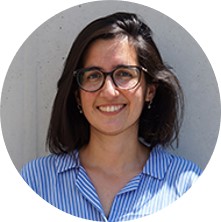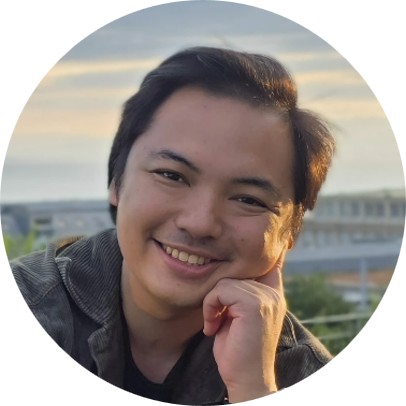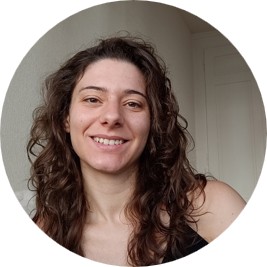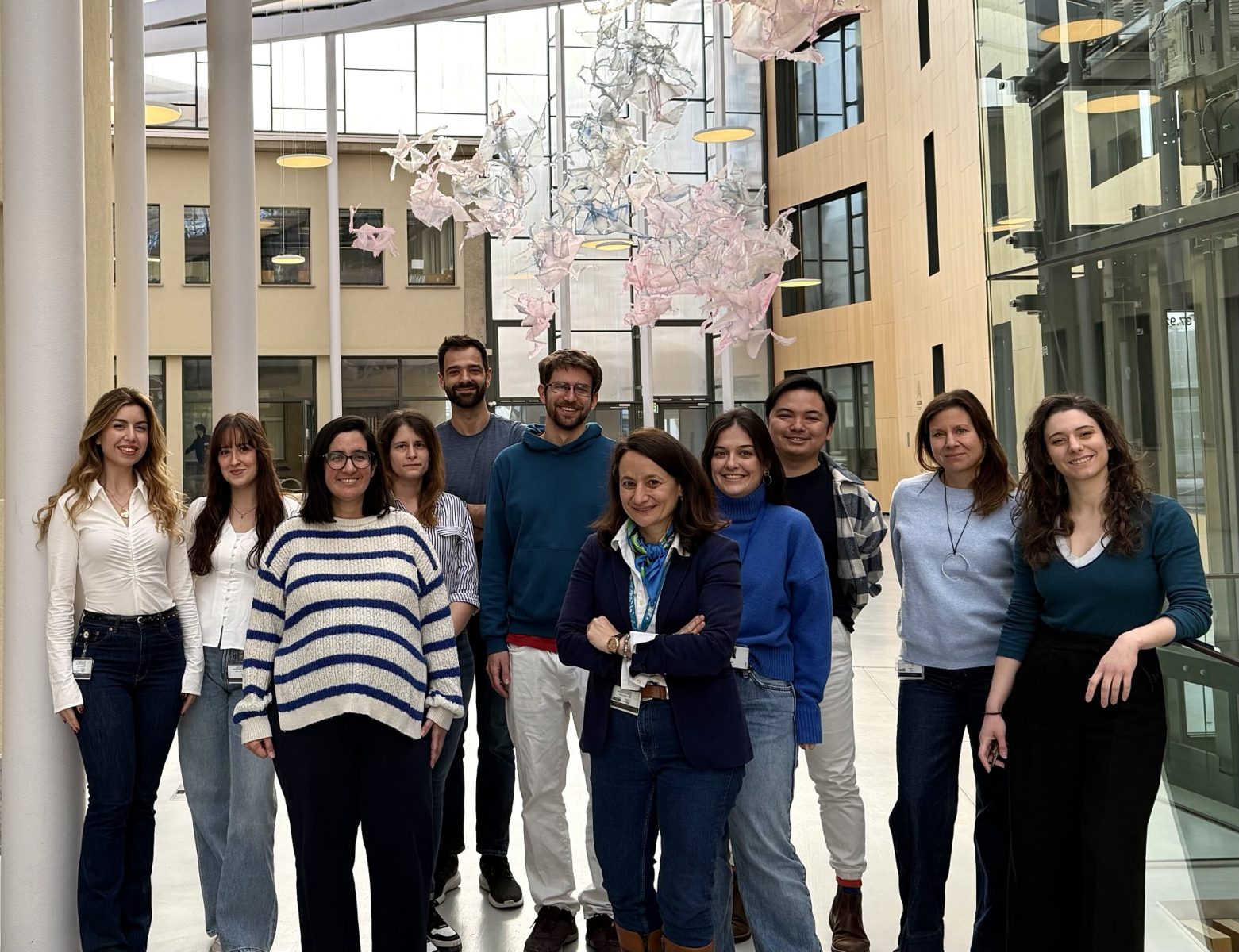TEAM

Olaia Naveiras, CHUV/UNIL Associate Professor
Olaia Naveiras studied Medicine at the Universidad Autónoma de Madrid, Spain, and pursued a Master’s degree in Immunology at the Pasteur Institute in Paris and Harvard Medical School, where she completed her PhD in Prof. George Q. Daley’s laboratory. Her research focused on novel microenvironmental determinants of hematopoietic stem cell commitment from pluripotent stem cells. She was the first to describe the role of adipocytes in adult hematopoiesis and the impact of biomechanical forces on hematopoietic stem cell specification during embryonic development. Her work earned the Hauser Award for the best research and teaching thesis. Her postdoctoral work at Prof. Matthias Lutolf’s laboratory (EPFL), focusing on single-cell approaches and bioengineering approaches to study hematopoietic stem cell fate specification.
In 2014, Prof. Naveiras established the Laboratory of Regenerative Hematopoiesis as a Swiss National Science Foundation (SNSF)-funded Assistant Professor. She was double-appointed at the Swiss Experimental Cancer Center (ISREC) and the Institute of Bioengineering at EPFL. In 2020, her lab moved to the University of Lausanne (UNIL) School of Biology and Medicine, hosted within the Department of Biomedical Sciences and situated across from the Lausanne University Hospital (Centre hospitalier universitaire vaudois, CHUV). The focus of the lab remains the understanding and modulation of the bone marrow microenvironment to improve blood progenitor function in malignant hematopoiesis, aging, and bone marrow failure.
Prof. Naveiras is board certified in Internal Medicine and in Hematology. She consults at the Hematology Service, Department of Oncology at CHUV, specializing in adult patients with bone marrow failure syndromes, including immune aplastic anemia, paroxysmal nocturnal hemoglobinuria (PNH), telomere biology disorders, Blackfan-Diamond anemia, Fanconi anemia and Shwachman-Diamond syndrome. She is an active member for the scientific committees of the American, European, and Swiss Societies of Hematology (ASH, EHA, SSH). In 2020, she was elected Vice-President of the Swiss Stem Cell Network (SSCN) and President of the International Bone Marrow Adiposity Society (BMAS). She has received the Young Investigator Award from the European Hematology Association (EHA) and the José Carreras Leukemia Foundation, and the 2024 SAKK-Abbie award for Digital Innovation in Hematology/Oncology.”

Silvia Vaz Ferreira Lopes, Laboratory technician
Silvia joined the Naveiras lab in 2020. She is obtained her Masters degree in Medical Biology (Immunology and Cancer) from the University of Lausanne in 2015. She manages the lab and is involved in numerous projects with all group members.

Tatiana Smirnova, CHUV Hematology Collaborating Senior Scientist
After her Bachelor of Arts degree from Northwestern University (Evanston, IL, USA), Tatiana Smirnova obtainedher M.S. and PhD degree in Biomedical Research from the Dept. of Anatomy and Structural Biology at the AlbertEinstein College of Medicine (2010, New York, USA) in the laboratory of Prof. Jeff E. Segall. Dr Smirnova investigated the complex interactions between tumor cells and tumor-promoting macrophages (TAMs) driving metastasis of breast cancer and HNSCC cells in vivo. Her postdoctoral studies in Basel, Switzerland, at the Friedrich Miescher Institute for Biomedical Research with Prof. Nancy E. Hynes, were expanded into the extracellular tumor milieu, controlled by the secreted serine protease inhibitor serpinE2. In parallel, Tatiana managed the multiphoton intravital imaging microscope facility for the Department of Cancer and Cell Signaling(FMI, Basel) until 2016, and enjoyed being an imaging collaborator in other projects including glioblastoma. In 2016, Dr Smirnova started working as a research fellow at the CHUV in the service of hematology, DMLP, with a focus on “reprogramming” protumoral macrophages and delineating the role of the microenvironment in acute myeloid leukemia (AML) and resistance to treatments. Tatiana received the first Young Research Investigator Award prize from Fond’Action Contre le Cancer and several grants for her work at the CHUV.

Gabriela Desdín Micó, SNSF Ambizione Junior Group Leader / Lecturer-Department of Biomedical Sciences
Gabriela Desdin obtained her Bachelor’s degree in chemistry from Oviedo University in Asturias. She then pursued her Master’s and Ph.D. in Biomedicine at the Centro de Biología Molecular Severo Ochoa at the University of Madrid under the mentorship of Prof. Maria Mittelbrunn. A fundamental contribution of her doctoral research was the discovery of how mitochondrial dysfunction could induce inflammatory T-cell phenotypes within a mouse model, mimicking the effects of aging on the immune system. She unveiled the role of malfunctioning T cells in the process of inflammaging, which accelerates the progression of systemic aging, characterized by comorbidities and reduced lifespan.
Following her doctoral studies, Gabriela joined the University of Lausanne, working with Professor Alejandro Ocampo on the characterization of novel whole-body reprogrammable mouse strains to better understand the systemic consequences of inducing in vivo reprogramming to maximize its beneficial effects on health and lifespan. During this time, she received the prestigious EMBO Postdoctoral Fellowship to support her work in Prof. Ocampo’s lab.
In 2024, Gabriela joined Prof. Naveiras’s lab as a senior postdoctoral fellow, where her research focuses on reprogramming the aged hematopoietic compartment with the goal of rejuvenating it.
In December 2024, she started her own research group at the University of Lausanne after receiving the highly competitive SNSF Ambizione grant. Her current research interests include the aging immune response and enhancing the regenerative capacity of the hematopoietic system by partial reprograming.

Fabien Bonini, Postdoctoral Fellow
Fabien completed his pharmacy thesis at the University of Montpellier and earned a Master’s in biomedical sciences from the University Joseph-Fourier in Grenoble. He later obtained a PhD in Materials Science from the University of Geneva, where he focused on the synthesis and characterization of advanced biomaterial scaffolds for soft tissue regeneration, including skin and brain repair. Fabien has since held multiple postdoctoral positions at the University of Geneva, where he designed chemokine-releasing and immunomodulatory biomaterials. He also contributed to the development of artificial niches to support ectopic haematopoiesis. He joined the team in May 2025 as a postdoctoral fellow to work on the project entitled “Burning Marrow Fat: role of the bone marrow adipocyte maturation axis in hematopoietic stem and progenitor cell function” funded by the SNSF.

Jelena Zaric, Collaborating Scientist
After obtaining her PhD in Molecular and Cell Biology from the University of Belgrade, Serbia, Jelena continued working on hereditary iron deficient anemia, hematopoiesis and beta globin transcription regulation until 2000. Jelena then moved to the lab of Dr Jurg Schwaller, CMU, Geneva where she was working on oncogenic signalling pathways in DLBCL. Neoangiogeneis, tumour initiation and chronic inflammation were the projects on which Jelena was subsequently involved in the lab of Prof. Curzio Ruegg. Before joining the lab of Prof. Olaia Naveirras, she was working in the lab of Prof. Freddy Radtke, EPFL, on the chromatin landscape of oncogenic drivers in T Acute Lymphoblastic Leukaemia.

Charles Bataclan, Scientist
Charles obtained his Bachelor’s and Master’s degree in Molecular Biology and Biotechnology from the University of the Philippines. During his master’s thesis in the lab of Reynaldo Garcia, he studied the functional consequences of deregulated expression of the lncRNA, T-UCR 388 in colorectal cancer cells. In addition, he worked as a researcher for the Philippines’ national drug discovery consortium, optimizing and conducting cell-based assays for different disease indications on biologically-derived compounds. Charles recently finished his PhD in the Naveiras lab in November 2024 studying the trancriptomic, anatomic and functional heterogeneity of human bone marrow mesenchymal stromal cells.

Fabrice Renaud, PhD Student
Fabrice obtained his Bachelor’s and Master’s degrees in Medical Biology at the University of Lausanne. For his master thesis, he spent one year at the Ragon Institute in Boston studying processing features of HIV antigens associated with spontaneous control of the disease. He was also employed as a graduate student by the Massachusetts General Hospital. He then worked as a bioengineer for a start-up company specializing in lab equipment and then as a researcher for the oncology department of the University of Lausanne. Fabrice joined the Naveiras lab in November 2021 as a PhD student, co-supervised by Prof. Pedro Romero, to study the influence of the adipogenic differentiation axis of bone marrow stromal cells on immune cells in the context of acute myeloid leukemia.

Konstantina Kioseoglou, PhD Student
Konstantina (Nadia) earned her Bachelor of Science in Molecular Biology from Aristotle University of Thessaloniki, Greece, then pursued a Master’s degree in Medical Biology at the University of Lausanne (UniL). During her bachelor’s studies, she developed an interest in stem cell therapy, conducting a year-long thesis in regenerative medicine at Prof. Kritis’ lab. During her Master’s at UniL, she worked as a pre-master student at the Laboratory of Research in Neuroimaging directed by Dr. Kherif, investigating the crosstalk between the brain and lungs during respiratory diseases. Her master’s thesis at the Department of Fundamental Oncology in Dr. Verdeil’s lab focused on exploring the impact of PDGFRβ in muscle invasive bladder cancer. In June 2024, she joined the Department of Biomedical Sciences at UniL as a PhD student, co-directed by Prof. Olaia Naveiras and Dr. Gabriela Desdin-Mico, eager to decipher the aged immune response and scrutinize its revitalization by partial reprogramming of the immune, hematopoietic and stroma compartment.

Angela Martins, PhD Student
Angela obtained her Bachelor’s and Master’s degrees in Medical Biology from the University of Lausanne. During her Master’s, she studied bacteriophage activity against Pseudomonas aeruginosa in artificial sputum at CRISP (CHUV) under Dr. Grégory Resch supervision. She then completed her Master’s thesis in Prof. Olaia Naveiras’ lab, investigating stromal-adipogenic interactions in acute myeloid leukemia under chemotherapy. After graduating, she continued in Prof. Naveiras’ laboratory as an intern, co-supervised by Dr. Gabriela Desdin Mico, contributing to the development of a single-cell RNA sequencing pipeline for studying stromal and immune components and optimizing irradiation protocols. In January 2025, Angela began her PhD thesis, funded by Zoé4Life, focusing on modulating the bone marrow adipocyte differentiation axis as a niche-directed strategy to target MRD in ALL.

Ana Jiménez Sánchez, PhD Student
Ana obtained her Bachelor’s degree in Pharmacy from Complutense University of Madrid. She then pursued a Master’s in Biomedical Research, specializing in cancer, at the University of Navarra. During her Master’s thesis, she focused on immunology and immunotherapies, conducting a year-long research project in Prof. Pablo Sarobe’s lab, where she worked on developing a novel CAR-Macrophage therapy for hepatocellular carcinoma. In 2024, Ana joined Dr. Alicia González’s lab at the Biomedical Research Institute in Madrid, where she studied the role of microRNAs in T cells during tumorigenesis. This project allowed her to expand her expertise in mouse models, to deep her knowledge of flow cytometry. She also collaborated with colleagues on the study of microRNAs in autoimmune diseases, conducting experiments with aged mice, which has strengthened her understanding of aging in disease. In January 2025, she joined the laboratory of Prof. Olaia Naveiras at UniL as a PhD student, under the direction of Dr. Gabriela Desdín-Mico. Her research focuses on the exciting project “Rejuvenating hematopoietic stem cells through partial in vivo reprogramming for improved functionality in aging and bone marrow failure syndromes”.

Maria Chiara Galavotti, PhD Student
Maria Chiara earned her BSc in Biotechnology from the University of Parma and her MSc in Cellular and Molecular Biotechnology at the University of Trento, focusing on Cancer Biology. As part of the Erasmus+ program, she carried out her Master thesis in Prof. Paul Murray’s lab, at the University of Limerick, where she investigated the correlation between the a tumour microenvironment-associated protein, DDR1, and a protein linked to genome instability, CENP-E, in the context of diffuse large B cell lymphoma. This experience allowed her to explore image-based analysis and spacial proteomics. In 2023, she joined Prof. Hind Medyouf’s lab at the Georg-Speyer-Haus Institute, contributing on her research on metabolic vulnerabilities in breast cancer metastasis, gaining experience in in vivo models and ex vivo systems. In June 2025, she joined Prof. Olaia Naveiras’ lab at the University of Lausanne, where, under the co-supervision of Dr. Fabien Bonini, she is focusing on dissecting how bone marrow adipocytes differentiation status impacts hematopoietic stem cell support.

Hugo Verzone, Research Assistant
Hugo Verzone obtained his Bachelor’s degree in Life Sciences Engineering from EPFL, where he studied bacterial mechanosensing in the context of twitching motility in Pseudomonas aeruginosa under the supervision of Prof. Alexandre Persat. After completing his degree, he joined Prof. Norbert Perrimon’s laboratory as a research assistant, working on the development of a pooled CRISPR-based genetic screening platform for Drosophila and tick cultured cells. In February 2025, Hugo joined Prof. Naveiras’ lab as a research assistant for his Swiss civil service. His current work focuses on developing a bone marrow-on-a-chip model to investigate the biomechanical regulation of hematopoiesis.
